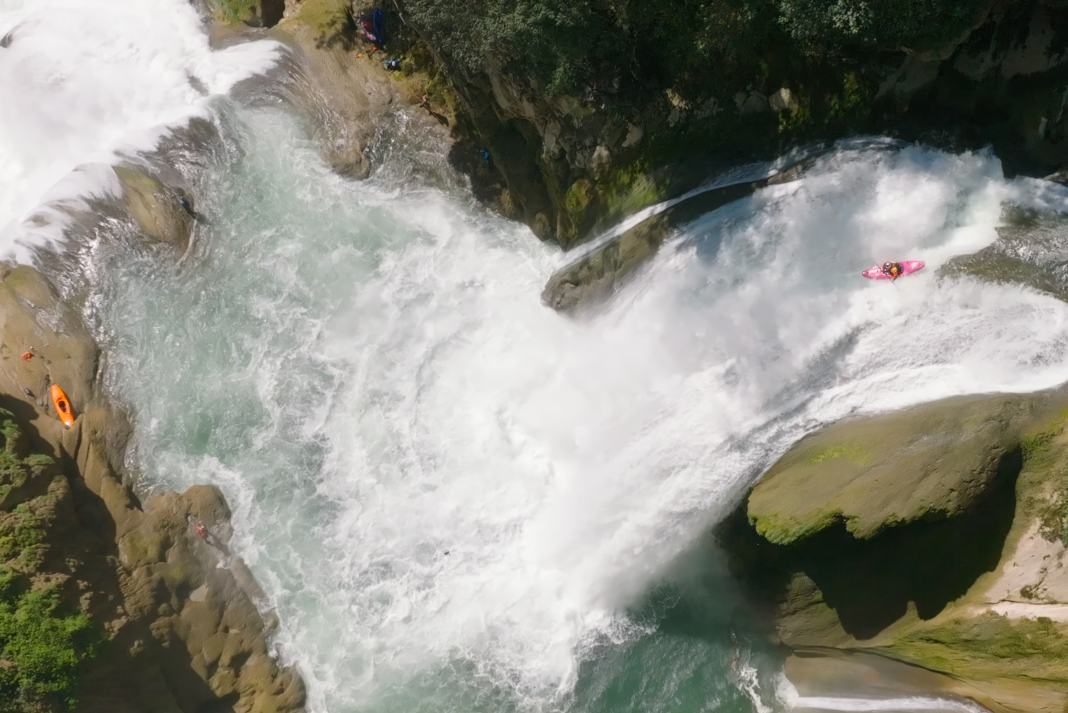The Ivindo River winds through the Gabon Rainforest, with elephants and hippos, thick forest, and a maze of rapids untouched by whitewater paddlers—until recently.
Four-man elite kayak team of Adrian Mattern, Dane Jackson, Kalob Grady and the late Bren Orton tackled a 90-mile (145 km) expedition on the river with the goal of the first descent of four major rapids on the Ivindo River in Gabon, a country on the central African Atlantic coast bordered by Cameroon, Equatorial Guinea and the Congo. The Red Bull film Gabon Uncharted documents the depth of their drive to complete the expedition.
Meet the SEND collective
The team, self-named the SEND Collective, includes some of the top names in whitewater kayaking and as the film cheekily notes, most definitely the top names on whitewater kayaking Instagram.
Dane Jackson is often called the GOAT (greatest of all time) whitewater kayaker. Kalob Grady grew up on the banks of the Ottawa River and is now the head coach for World Class Academy. Bren Orton was the first European to paddle the 128 ft (almost 40m) Big Banana Falls in Mexico. In May 2024, Orton tragically passed away while kayaking with a group on the Melezza River in the Swiss Alps.
For the last member of the team, Adrian Mattern, the driving force behind the trip, the Ivindo has been a childhood dream to follow the expedition of Olaf ‘Big O’ Obsommer in 2007. On Obsommer’s Ivindo expedition they portaged most of the major rapids due to a lack of local knowledge and resources.
This attempt is different—with new technology and beta from Obsommer’s 2007 trip, the SEND collective seems set up for success. The ultimate game-changer this time around boils down to drones. Not only useful for capturing videos from above, drones allowed the paddlers to scout the rivers from the skies, virtually creating an aerial map of the area.
Is there more to the SEND Collective than big water and money shots?
Gabon Uncharted: Sending Ivindo Falls is not just another big water film. The film, produced by videographer David Arnaud who narrates and seems slightly skeptical of the SEND collective and their Instagram hype, on one hand sets out to make an epic whitewater expedition video.
But the film also asks a question—when you peel back the photos of epic drops, flips and thousands of likes, what’s left?
In the film, we watch the SEND collective pore over route plans and water level data prepared by Mattern. The SEND collective spends three days inspecting the area, and meets with local park rangers of Ivindo National Park, as they take extra care to minimize the impact of their expedition on the environment and pay astute attention to their own safety in the context of an extreme wilderness sport.
“We were told that there are most likely, almost certainly, perhaps not that many crocodiles in this area,” Orton jokes as they begin their journey.
The first major rapids on the Ivindo fan out through the forest in a labyrinthine rapids complex over a mile wide. On this first send, Arnaud describes the SEND collective as “joyful kids on an awesome playground.”
While there’s plenty of exciting big water shoots in the film, just as interesting, if not more so, is the group’s approach to risk management. In a move that seems to surprise the filmmaker, the SEND collective of Instagram fame unanimously chooses to play it safe and portage one of the large, iconic waterfalls they came to descend.
“Too often, group dynamics, biases, and egos lead to stupid decisions. Here it’s the opposite,” narrates Arnaud. “The SEND team navigates these pitfalls with grace and humility.”
Throughout the film we watch the SEND collective run incredible rapids, read their favorite books and get bug bites. We also watch as they help team member Mattern come to terms with the idea that one of the falls he’s dreamed of paddling is likely unrunnable and delicately handle the line between safety and the drive to push their skills for “the send.”
What’s compelling about Gabon Uncharted isn’t that you’re watching top whitewater kayaking athletes do inspiring athletic things—it’s that you’re watching top whitewater kayaking athletes work as a team, manage risk as a team, and ultimately just be people in a way that is inspiring to paddlers wherever they are with their own “send.”




